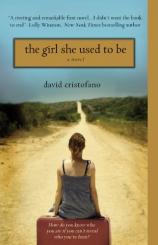Reading Group Guide
Discussion Questions
The Girl She Used to Be

1. From the first sentence of the story, the narrator asks you to take part in the action. Why do you suppose David Cristofano decided to tell this story in the first person from the point of view of a woman? Who would have more at stake in witness protection, a man, woman, or child?
2. Early in the novel, Melody appears conflicted in having feelings for both Sean and Jonathan. What is driving her need for affection? When does she realize she has made a decision? What solidifies this decision?
3. At various points in the novel, the reader is given a glimpse into the previous six identities Melody has had. Which identity acts as a turning point? What event occurred that changed the trajectory of her life?
4. The roles of good and evil are repeatedly swapped in Melody’s life. Do both sides --- the Feds and the Mafia --- possess both good and evil, or are they really polar opposites of one another? How does Melody influence your view of each side?
5. Though romantically inexperienced, Melody longs to be noticed by both Sean and Jonathan, trying different ways to capture their eyes. In what ways has she felt invisible to men her whole life? How has she overcompensated?
6. Due to her constant relocation, lack of parental guidance and inability to form lasting relationships, Melody has the body of a woman but the emotional and experiential psyche of a girl. How is this dangerous? What additional problems does this pose for her, given the life she must lead? How does it influence her interaction with all of the men in her life?
7. Melody’s initial interplay with every authority figure --- Farquar, Sean, Donovan, Sanchez --- is semi-hostile. What makes Melody react this way? How does Jonathan’s influence have her responding differently by the time she meets his family?
8. Melody and Sean share a few conversations that expose the failings of WITSEC for both the protectors and the protected. From each of their points of view, how is the system not working? How does it work as intended? How is WITSEC more or less vital to the Justice Department today?
9. Jonathan tries to distinguish himself from his Mafia ties in several ways. How has he successfully achieved this? In what ways is he a typical Mafioso?
10. Melody is scarred by the explicit violence she witnesses at age six. Repeatedly, she attempts to rid Jonathan of his reactionary viciousness to seemingly topical problems. Though later in the story, she finds security in his violent behavior. What changes her mind? Would you react the same way? Why or why not?
11. Throughout the entire novel, the importance of identity is explored. How is the life Melody has led different from that of a foster child? Of a prisoner? Of an individual living under communist rule? How are they the same?
12. How do the tangible things in Melody’s story --- the food, clothes, cars, hotels --- reflect her happiness, security and satisfaction? Are these things metaphorical or incidental? Would her story be different if things were reversed? Why or why not?
13. Being in WITSEC for twenty years has had a negative impact on Melody. In what ways has it made her stronger?
14. What is the significance of the chapter titles? How do they differ? What is the special significance of the final chapter’s title?
The Girl She Used to Be
- Publication Date: March 10, 2010
- Paperback: 272 pages
- Publisher: Grand Central Publishing
- ISBN-10: 0446582212
- ISBN-13: 9780446582216








